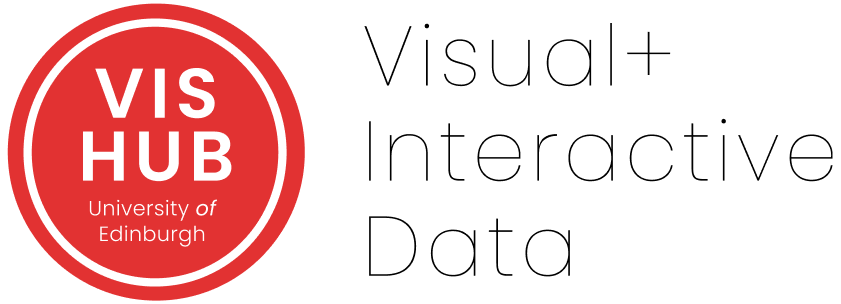
Interdisciplinary research lab in data visualization and HCI at the University of Edinburgh.
People - Jobs+PhD Projects
Equipment (kit) - Resources
Teaching - Outreach
Projects/Tools - Student Projects
https://vishub.net
Follow @vishublab
(Possible) PhD Topics at VisHub
Immersive, Hybrid, and Situated Analytics
Problem: Lots of data is embedded into specific spatial contexts, such as, sensors, transportation, architecture, data about books in libraries, or even on an infographic on paper, poster, or screen. Visualizing these data on displays causes a mismatch between the specific local context (e.g., where exactly is the sensor located?) and the representation of the respective data. This mismatch can be bridged by mixed reality that projects visual representations directly into a viewers’ field of view, overlaying it with reality.
Approach: This project investigates effective and creative techniques to design visualizations in mixed reality for a range of potential use cases. The project will study design processes, guidelines, and interaction techniques for cases in real-world as well as hybridizing content from mixed reality and traditional presentation media such as paper and screens.
Skillset: Mixed reality, Unity, JavaScript or C#, visualization design, graphics design.
Contact: Benjamin Bach
Dashboard Design
Problem: Dashboards are ubiquitous across many domains including health, energy, governance, business etc. With the recent Covid pandemic, dashboards have found their way into the mainstream media with may news outlets publishing dashboards on public health, climate change, and other public issues. However, there is very little applicable guidance on what makes a dashboard effective and how to design effective dashboards.
Approach: This project investigates ways to evaluate the effectiveness of dashboards as well as proposing means to author dashboards. We will work across a range of domains and applied use cases and will engage in design, prototyping, co-design, and rigorous evaluation methods.
Skillset: D3, JavaScript, Tableau, Data Science, Data analysis.
Contact: Benjamin Bach
Multivariate Network Visualization (with focus on Geo-temporal visualizations)
Problem: Relational data (e.g., networks) are used to represent many data sets and real-world phenomena such as social networks, food-webs, functional and structural brain networks, trade relationships, and many more. However, many of these networks do have additional data attached to the, such as geography (e.g., trading networks), or time (e.g., functional brain connectivity, social networks). How can this complexity be visualized to allow for both effective interactive exploration and engaging communication?
Approach: This project will design new visualization techniques for geographic and temporal networks across a range of domains. We will engage in co-design sessions, workshops, prototyping, system-building, longitudinal projects, software architecture and a range of human-centered evaluation techniques.
Skillset: D3, webdevelopment, Data Bases, visualization design, graphic design.
Contact: Benjamin Bach
Tools for Visualization Literacy
Problem: Visualization literacy is the ability to read, design, create, apply, and critique data visualizations for various tasks. Empowering people in these abilities requires teaching methods and material that goes beyond the traditional classroom environment but that includes informal learning: self-led learning that happens on different paces, at home/work, by working professionals, and alongside the process of using or designing visualizations in people’s daily work. How can these non-traditional scenarios be supported?
Approach: This project will survey, explore, develop, and evaluate, methods and digital tools to supporter learning visualization literacy beyond the classroom.
Skillset: D3/webdevelopment, visualization design, data science.
Contact: Benjamin Bach
Participatory Peace and Conflict Analysis
Problem: Political decision makers, organizations, advisors, and researchers rely on data about peace and conflicts. These data can include peace agreement documents, violence and riots, political indicators, environmental factors, demographics, etc. In order to support these decisions, data from many different resources (social media, data bases, sensors, surveys, …) need to be combined, aggregated, analyzed, and visualized.
Approach: This project investigates ways for visualizing peace and conflict data for analysis and participation. Participation referring to feedback channels (e.g., through annotations and comments) for the audience of these visualizations, a crucial point to provide scrutiny, transparency, and enrich data through personal accounts.
Skillset: D3/Webdevelopment, visualization design, data science, data bases
Contact: Benjamin Bach
The role of Style in data visualization
Problem: Data visualizations and data stories vary a lot in their respective style: color, narration, graphics, visual representation, explanations, and so on. To day there is no comprehensive understanding of what these style factors are and what their impact is on the visualization understanding and engagingness.
Approach: This topic will investigate style through a range of factors. We will engage in user-studies and design sessions, build design spaces and guidelines for making visualizations more effective and engaging.
Skillset: graphic design, visualization design
Contact: Benjamin Bach


